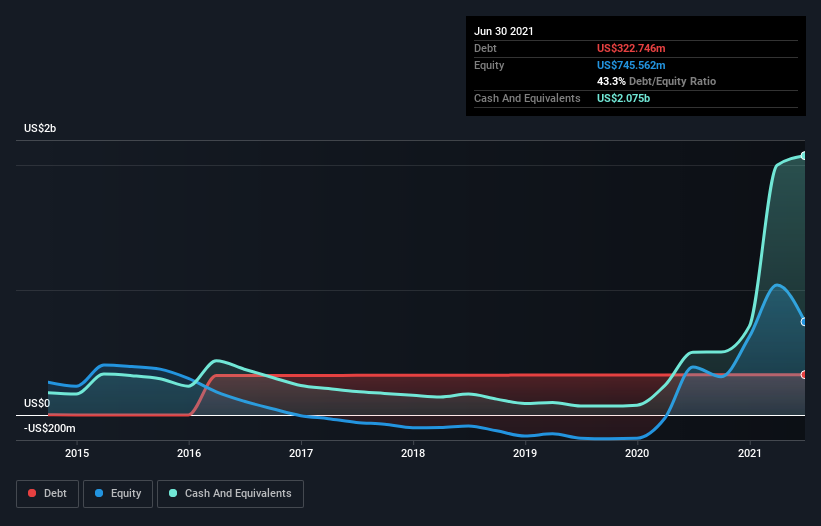Is Novavax (NASDAQ:NVAX) Using Debt In A Risky Way?
Some say volatility, rather than debt, is the best way to think about risk as an investor, but Warren Buffett famously said that 'Volatility is far from synonymous with risk.' It's only natural to consider a company's balance sheet when you examine how risky it is, since debt is often involved when a business collapses. We note that Novavax, Inc. (NASDAQ:NVAX) does have debt on its balance sheet. But is this debt a concern to shareholders?
When Is Debt Dangerous?
Debt and other liabilities become risky for a business when it cannot easily fulfill those obligations, either with free cash flow or by raising capital at an attractive price. Ultimately, if the company can't fulfill its legal obligations to repay debt, shareholders could walk away with nothing. However, a more frequent (but still costly) occurrence is where a company must issue shares at bargain-basement prices, permanently diluting shareholders, just to shore up its balance sheet. By replacing dilution, though, debt can be an extremely good tool for businesses that need capital to invest in growth at high rates of return. The first step when considering a company's debt levels is to consider its cash and debt together.
View our latest analysis for Novavax
What Is Novavax's Net Debt?
As you can see below, Novavax had US$322.7m of debt, at June 2021, which is about the same as the year before. You can click the chart for greater detail. However, it does have US$2.07b in cash offsetting this, leading to net cash of US$1.75b.
How Healthy Is Novavax's Balance Sheet?
According to the last reported balance sheet, Novavax had liabilities of US$1.65b due within 12 months, and liabilities of US$352.5m due beyond 12 months. Offsetting this, it had US$2.07b in cash and US$71.4m in receivables that were due within 12 months. So it actually has US$142.2m more liquid assets than total liabilities.
This state of affairs indicates that Novavax's balance sheet looks quite solid, as its total liabilities are just about equal to its liquid assets. So while it's hard to imagine that the US$17.3b company is struggling for cash, we still think it's worth monitoring its balance sheet. Simply put, the fact that Novavax has more cash than debt is arguably a good indication that it can manage its debt safely. The balance sheet is clearly the area to focus on when you are analysing debt. But ultimately the future profitability of the business will decide if Novavax can strengthen its balance sheet over time. So if you want to see what the professionals think, you might find this free report on analyst profit forecasts to be interesting.
Over 12 months, Novavax reported revenue of US$1.2b, which is a gain of 2,253%, although it did not report any earnings before interest and tax. That's virtually the hole-in-one of revenue growth!
So How Risky Is Novavax?
While Novavax lost money on an earnings before interest and tax (EBIT) level, it actually generated positive free cash flow US$593m. So taking that on face value, and considering the net cash situation, we don't think that the stock is too risky in the near term. We think its revenue growth of 2,253% is a good sign. We'd see further strong growth as an optimistic indication. There's no doubt that we learn most about debt from the balance sheet. But ultimately, every company can contain risks that exist outside of the balance sheet. Be aware that Novavax is showing 1 warning sign in our investment analysis , you should know about...
When all is said and done, sometimes its easier to focus on companies that don't even need debt. Readers can access a list of growth stocks with zero net debt 100% free, right now.
This article by Simply Wall St is general in nature. We provide commentary based on historical data and analyst forecasts only using an unbiased methodology and our articles are not intended to be financial advice. It does not constitute a recommendation to buy or sell any stock, and does not take account of your objectives, or your financial situation. We aim to bring you long-term focused analysis driven by fundamental data. Note that our analysis may not factor in the latest price-sensitive company announcements or qualitative material. Simply Wall St has no position in any stocks mentioned.
Have feedback on this article? Concerned about the content? Get in touch with us directly. Alternatively, email editorial-team (at) simplywallst.com.

 Yahoo Lifestyle
Yahoo Lifestyle 

